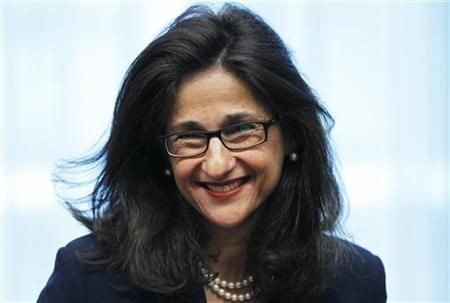Who Is Minouche Shafik? The Next Bank Of England Chief Could Be An Egyptian Woman

KEY POINTS
- Woman could head Bank of England for first time in its 325-year history
- Bank leadership change comes at delicate point as Brexit approaches
- Nemat "Minouche" Shafik, Shriti Vadera, Andrew Bailey, Kevin Warsh, Paul Tucker, Raghuram Rajan, Ben Broadbent and Jon Cunliffe are mentioned as candidates
The Bank of England is expected shortly to name a new governor to succeed John Carney, who will step down in late January to take a position at the United Nations.
One of the leading contenders for the coveted position is Nemat "Minouche" Shafik, an Egyptian-born economist who currently serves as director the London School of Economics and in the past worked as deputy governor at the Bank of England.
The Times of London reported rumors have circulated that Shafik already has been selected for the top job by the new government of Boris Johnson.
If she is chosen, she would become the first female governor in the 325-year history of the central bank.
Shafik’s resume also includes a stint at the International Monetary Fund where she led efforts to help develop Arab economies in the wake of the 2011 Arab Spring.
Shafik would take over the monetary policy of the fifth largest economy in the world at a crucial time in its history as the U.K. prepares to leave the European Union. The bank already has warned the U.K. could see its gross domestic product reduced by 5.5% if it left the E.U. without negotiating a deal on future political and trading relations with the bloc.
However, during her stint as deputy governor of the Bank of England, Shafik made few comments on monetary policy. During her tenure (2014-17) she was in charge of markets and banking, including the central bank's asset purchase program. In addition, she reportedly left the bank to take the job at the London School of Economics due to a difficult relationship with Carney.
On the plus side, she is viewed as a pragmatist who shares Johnson’s desire to cut bureaucratic red tape.
Shafik, 57, was born in Alexandria, Egypt, but left the country as a small child with her family to flee the regime of Gamal Abdel Nasser.
“It taught me that you can go from having a lot to having nothing overnight and you can’t get too attached to stuff because you can lose it,” she told the London Evening Standard newspaper in 2015.
Following her studies in both the U.S. and U.K., she worked at the World Bank for 15 years, becoming its youngest vice president at the age of 36.
Other possible contenders for the governorship include another woman, Shriti Vadera, who is chairwoman of banking giant; Andrew Bailey, a former central bank deputy governor, who headed the main financial regulator, the Financial Conduct Authority; Kevin Warsh, a former U.S. Federal Reserve official, whom the central bank hired to review its procedures and transparency; Paul Tucker, another former deputy governor; Raghuram Rajan, the former chief of Reserve Bank of India; as well as current deputy governors Ben Broadbent and Jon Cunliffe.
The choice of the next bank governor will lie primarily in the hands of Sajid Javid, chancellor of the exchequer.
© Copyright IBTimes 2025. All rights reserved.





















